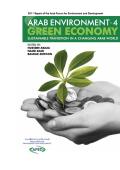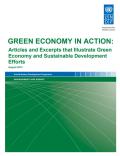This policy manuel aims to help the European Union’s Eastern Partnership (EaP) countries – Armenia, Azerbaijan, Belarus, Georgia, Moldova and Ukraine – design or reform economic instruments related to environmentally harmful products. Within the broad range of economic instruments to promote greener growth, this manual addresses instruments directed at changing consumer purchasing behaviour (product taxes) and those targeting improvements in waste generation and management (deposit-refund systems and extended producer responsibility schemes). The main target audience of this policy manual includes government stakeholders (ministries of environment, economy and finance) as well as business communities, non-governmental and academic institutions in EaP countries.
Financial constraints are among the most important barriers to proper municipal solid waste (MSW) management in the developing countries of Asia and the Pacific. The reform of fiscal measures and the adoption of economic instruments could help local governments by increasing revenue, causing MSW management authorities in the region to attempt to recover costs by levying fees for their services. However, the polluter pays principle is not easy to enforce in countries where the population has never paid the actual cost of public services aimed at mitigating environmental damage. Since it directly affects their available income, local people often do not understand why they should pay for these services while at the same time, rising public awareness of environmental issues is making it more difficult to implement low-cost solutions, such as the creation of new disposal sites. The fermentation of waste in open dumps and landfills generates landfill gas (LFG), a major component of which is methane, a powerful greenhouse gas (GHG). Proper management of MSW which includes utilizing this LFG, can thus contribute to climate change mitigation.


The Green Economy is one in which the vital linkages among the economy, society, and environment are taken into account. This selection of articles and excerpts emerged in response to the need to fill the knowledge gap on practical, concrete, and on the ground green economy country experience. It is in this spirit that the articles and excerpts included in this publication have been selected: to provide information and knowledge for policy and decision makers and practitioners on the positive implications of greening some priority sectors, including job creation, resource efficiency, and generally contribution to sustainable development through an extensive review of scientific publications and magazines.
The sectors analysed are water, agriculture, energy, industry, business, ecosystems, technology, waste management. The report contains several case studies, including from China, Egypt, the United Arab Emirates, the United Kingdom and Europe.
